39 free body diagram on incline
Solution a). Free Body Diagram The box is the small blue point. In the diagram below, W is the weight of the box, N the normal force exerted by the inclined plane on the box, F a is the force applied to have the box in equilibrium and F s the force of friction opposite F a. b) The box is at rest, hence its acceleration is equal to 0, therefore the sum of all forces acting on the box is equal ... Newton's Laws Vectors, Free Body Diagrams, & Inclined Planes Includes Friction, Weight, Universal Gravitation, and Linear Spring Force A) 170. m/s B) 214 m/s C) 226 m/s D) 270. m/s 1.An airplane traveling north at 220. meters per second encounters a 50.0-meters-per-second crosswind from west to east, as represented in the
The free body diagram is a sketch of the forces on an object, or the causes of motion. Acceleration is the effect of those forces and therefore does not show up on the FBD. It will make an appearance in the equation. Why did you pick the coordinate system to be along the angle of the incline? You can select any coordinate system that you want ...
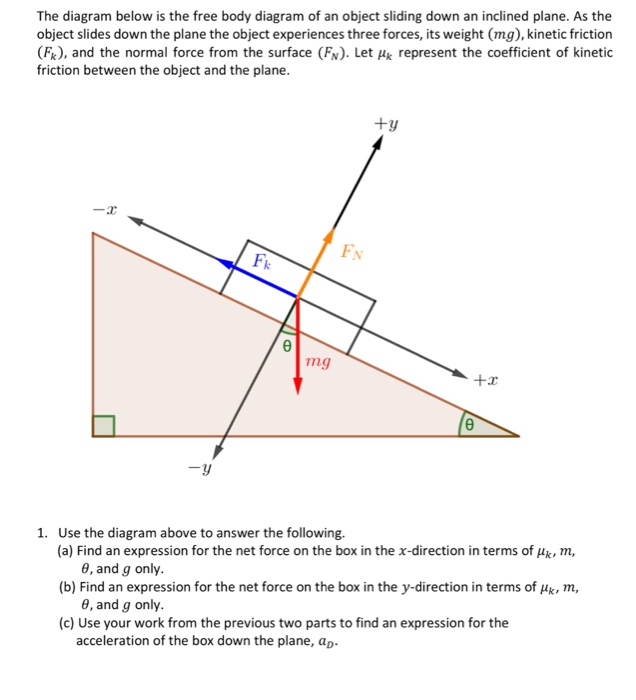
Free body diagram on incline
no, you're not applying the basic rule of a free body diagram: only include the forces on the body the weight of the box (or the man) only acts on the box (or the man), it does not act on the incline, and so it does not go on the free body diagram Examples of drawing free-body diagrams. To better understand how to draw free-body diagrams using the 3 steps, let's go through several examples. Example 1. A box is pushed up an incline with friction which makes an angle of 20 ° with the horizontal. Let's draw the free-body diagram of the box. The first step is to sketch what is happening: To understand this type of motion, it is important to analyze the forces acting upon an object on an inclined plane. The diagram at the right depicts the two forces acting upon a crate that is positioned on an inclined plane (assumed to be friction-free). As shown in the diagram, there are ...
Free body diagram on incline. 22/08/2020 · https://www.positivephysics.org Free-Body Diagram Drawing - Incline Forces - positivephysics.org positivephysics.org Figure 5.32 (a) The free-body diagram for isolated object A. (b) The free-body diagram for isolated object B. Comparing the two drawings, we see that friction acts in the opposite direction in the two figures. Because object A experiences a force that tends to pull it to the right, friction must act to the left. Because object B experiences a component of its weight that pulls it to the left ... Solving the Free-Body Diagram To solve the problem, the force on the rope required to move the box up the incline should be found. This is called the tension force. Finding this force requires a system of equations. As there is currently one known variable, the weight, there are three unknown variables also; therefore, three equations are required. this video has a box resting on an inclined plane. The box experiences friction as it accelerates down the incline. It shows how to solve this problem.
Each interactive concept-builder presents learners with carefully crafted questions that target various aspects of a discrete concept. There are typically multiple levels of difficulty and an effort to track learner progress at each level. Question-specific help is provided for the struggling ... Students will be able to construct a free body diagram and determine the net force acting on an object resting on an incline plane. Students will be able to calculate the normal force, weight, and weight components acting on an object on a frictionless incline. A free-body diagram can be drawn very simply, with squares and arrows, or you can make it much more complex. The only requirement is that you or someone else looking at it should be able to understand what the diagram is telling. A free-body diagram (FBD) is a representation of a certain object showing all of the external forces that acts on it. Question: Incline Free Body Diagram The figure above shows a block on an incline. Answer the following questions using the free body diagrams below. Answer the following questions using the free body diagrams below.
July 24, 2013 - Examines the forces on an object sitting on an inclined plane thoroughly. Free-body diagrams we saw are useful for understanding the net force on an object and, therefore, its motion. And finally, we learned a four-step process for drawing free-body diagrams. Step one is to isolate the object of interest. Step two is to list all the forces acting on that object. an incline not sliding, etc. ... Draw free body diagram for both boxes. N 2mg mg T T 2. Select axes x y x 3. Write Newton's 2nd law T mg ma ... Look at the free-body diagram. Here's what you should notice: friction is down the plane because the rocket is going up; the force up the plane is the force of the engine (Fe); to reduce clutter the orange parallel component of the weight has been shifted to a new location.
Science Physics Q&A Library Create a free body diagram for the block at rest on the incline, pictured above. Split any forces necessary into components and create equality marks where appropriate. Upload a picture of your FBD as your submission for this question. B U. Create a free body diagram for the block at rest on the incline, pictured above.
That said, the free-body diagrams for either (a) or (e) could correspond to a box at rest on a ramp, depending on the relative magnitudes of the forces. (In (e), you could imagine pushing lightly on the block sitting on the ramp, but no so much that state friction was overcome.) If we assume that the vectors' magnitudes are roughly correct, though, then (a) is the only …
Incline free body diagram. Close. 1. Posted by 1 day ago. Incline free body diagram. ... If it is parallel to the plans and downward, yes the arrow representing it on the free-body diagram points in the same direction as the parallel component of the weight. 1. Reply. Share. Report Save Follow.
A free-body diagram is a special example of the vector diagrams that were discussed in an earlier unit. What does a free body diagram look like? Free body diagrams consist of: A simplified version of the body (often a dot or a box) Forces shown as straight arrows pointing in the direction they act on the body.
"A free body diagram, sometimes called a force diagram, is a pictorial device, often a rough working sketch, used by engineers and physicists to analyze the forces and moments acting on a body. The body itself may consist of multiple components, an automobile for example, or just a part of a component, a short section of a beam for example, anything in fact that may be considered to act as a ...
The net force is 5 N, directed along the incline towards the floor. Let us consider another example. The free-body diagram shows the forces acting upon a 100-kg crate that is sliding down an inclined plane. The plane is inclined at an angle of 30 degrees. The coefficient of friction between the crate and the incline is 0.3.

Go Kart Carburetor Diagram Beautiful Gy6 150cc Carb – Gy6 Carburetor Diagram : UNTPIKAPPS - Gy6 ...
2. The normal force: The block is sitting on the incline. So the block exerts a force on the surface of the incline. So from Newton's Third Law (action-reaction), the incline exerts a force back on the block. This force, called the 'Normal force', acts on the block so it must be included in the free body diagram of the block.
The free body diagram helps you understand and solve static and dynamic problem involving forces. It is a diagram including all forces acting on a given object without the other object in the system. You need to first understand all the forces acting on the object and then represent these force by arrows in the direction of the force to be drawn.
Using the Free-Body Diagrams for Inclined Planes Concept Builder is quite simple. You will be presented with a verbal description of a physical situation for which you must construct a free-body diagram. You will need to read the description carefully so that you can identify the forces - direction and type - that act upon the object.
Often a Free Body Diagram is useful or necessary to solve a problem that involves forces. Follow these steps, and you'll solve any problem with little difficulty. 1. Draw one Free Body Diagram for each object (see below for what is a good FBD). 2. Break the forces up into components. 3.
On an incline having an angle of 30 degrees with the horizontal, a sack is moved up the slope with the help of a pulley attached to the upper end of the sack. Draw the free body diagram by representing the various forces acting on the sack, as well as the pulley. External forces are also acting, in this case. Answer :
Enjoy the videos and music you love, upload original content, and share it all with friends, family, and the world on YouTube.
Figure 5.32 (a) The free-body diagram for isolated object A. (b) The free-body diagram for isolated object B. Comparing the two drawings, we see that friction acts in the opposite direction in the two figures. Because object A experiences a force that tends to pull it to the right, friction must act to the left. Because object B experiences a component of its weight that pulls it to the left ...
Free-Body Diagram. Solving the Free-Body Diagram In order to solve the problem, the force on the rope necessary to move the box up the incline must be found. This is the tension force. Finding this force requires a system of equations. Although there is currently one known variable, the weight, there are three unknown variables; therefore,
Explanation and Free Body diagram for incline plane problems by James Dann for CK12.orgCC by SA
The free-body diagram in each case consists of only the dark, solid arrows. Forces of the same magnitude or lines of the same length are indicated by the same number of "tick" marks drawn through the two lines or arrows. Symbols:w=weight, T=tension,n=normal reaction force,f=friction. TNote that the 2Itension is not iproportional to string length.
Visit http://ilectureonline.com for more math and science lectures!In this video I will show the “traditional” and the free-body diagram methods of finding a...
Engaging math & science practice! Improve your skills with free problems in 'Drawing and interpreting free-body diagrams for incline planes' and thousands of other practice lessons.
Inclined plane force components. This is the currently selected item. Ice accelerating down an incline. Force of friction keeping the block stationary. Correction to force of friction keeping the block stationary. Force of friction keeping velocity constant. Intuition on static and kinetic friction comparisons.
November 7, 2011 - Let's take the example of a box on a ramp inclined at an angle of Θ with respect to the horizontal. We can draw a basic free body diagram for this situation, with the force of gravity pulling the box straight down, the normal force perpendicular out of the ramp, and friction opposing motion ...
Free-Body Diagrams for Inclined Planes. The Free-Body Diagrams for Inclined Planes Concept Builder includes a bank of 32 questions organized into 8 Question Groups and spread aross three difficulty levels. Each question provides a description of an object moving up or down an inclined plane. Learners must construct the free-body diagram for the situation.
Force and Motion on an Incline An inclined plane is basically a ramp. It is a flat surface that is sloped rather than horizontal. When solving problems about objects on an incline, it is convenient to choose a coordinate system with axes ... Rotated free body diagram ...
Review the key concepts and skills for inclined planes, including how to write Newton's second law for forces parallel and perpendicular to the incline.
March 26, 2020 - Draw a free-body diagram (which is a sketch showing all of the forces acting on an object) with the coordinate system rotated at the same angle as the inclined plane. Resolve the vectors into horizontal and vertical components and draw them on the free-body diagram.
Exploration 4.1 represents a free-body diagram for a 20-N block on a 30 o frictionless incline (the length of the vectors is given in newtons). The light gray lines represent the traditional xy axis, and the black lines represent the coordinates along the incline. The blue vector represents the normal force; the green vector represents the ...
Required forces to move bodies up inclined planes.
Objects on inclined planes will often accelerate along the plane. The analysis of such objects is reliant upon the resolution of the weight vector into components that are perpendicular and parallel to the plane. The Physics Classroom discusses the process, using numerous examples to illustrate ...
As noted in step 4 of the problem-solving strategy, we then construct the free-body diagram in (Figure)(b) using the same approach. Object B experiences two normal forces and two friction forces due to the presence of two contact surfaces. The interface with the inclined plane exerts external ...
09/03/2012 · Free-body diagrams for objects on an incline must (at the minimum) depict: Gravity’s downward force and the corresponding translated downhill force parallel to the surface. The surface exerts a Normal force that is perpendicular to the surface and both equal and opposite to gravity’s perpendicular surface component. An Applied Force acts uphill/against the …
So there is only a normal force at the contact point between wheel and incline, as shown in the free body diagram below. The normal forces are N1 and N2, and they are acting on the linkage. where g is the acceleration due to gravity The torque about the center of mass (denoted by the red dot) ...
Draw free body diagram for object sliding down an incline with friction (accelerating along the incline). (Not graded) In the below questions, consider the following notation. μs =. coefficient of static friction. μk =. coefficient of kinetic friction. N = force of incline on object in a direction perpendicular to the surface (normal)
To understand this type of motion, it is important to analyze the forces acting upon an object on an inclined plane. The diagram at the right depicts the two forces acting upon a crate that is positioned on an inclined plane (assumed to be friction-free). As shown in the diagram, there are ...
Examples of drawing free-body diagrams. To better understand how to draw free-body diagrams using the 3 steps, let's go through several examples. Example 1. A box is pushed up an incline with friction which makes an angle of 20 ° with the horizontal. Let's draw the free-body diagram of the box. The first step is to sketch what is happening:
no, you're not applying the basic rule of a free body diagram: only include the forces on the body the weight of the box (or the man) only acts on the box (or the man), it does not act on the incline, and so it does not go on the free body diagram
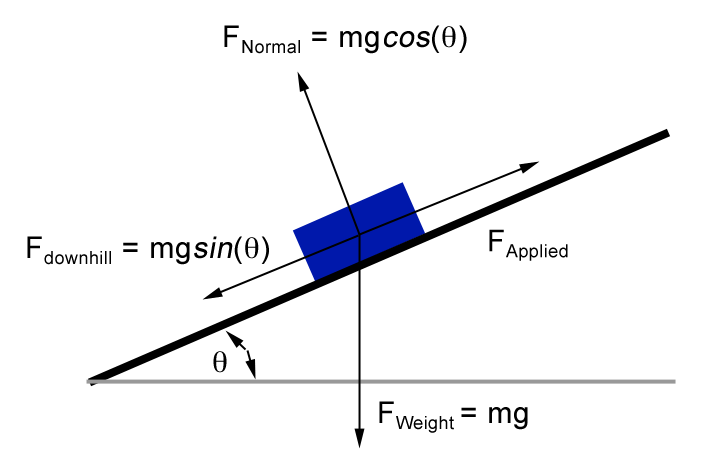


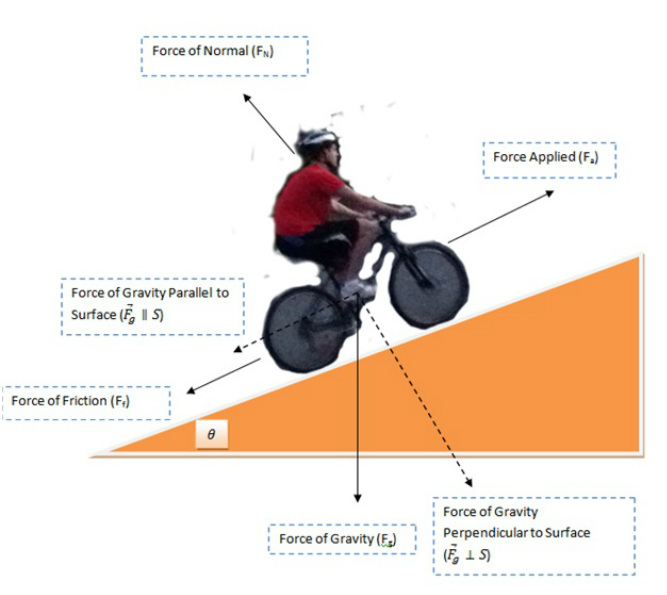




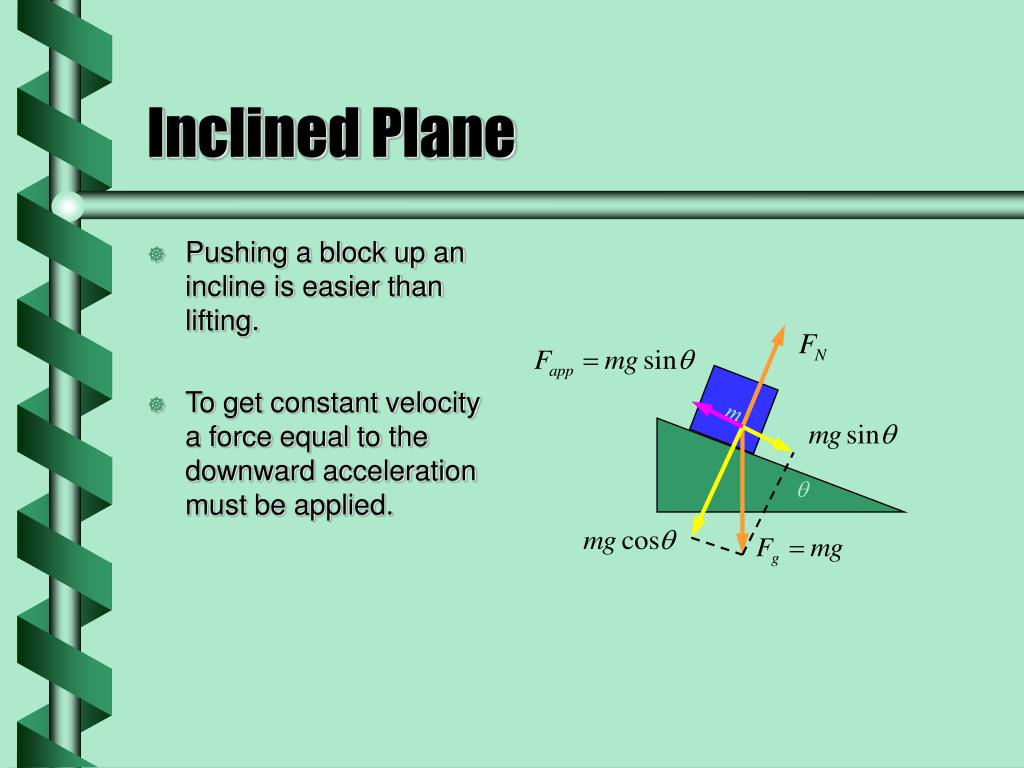


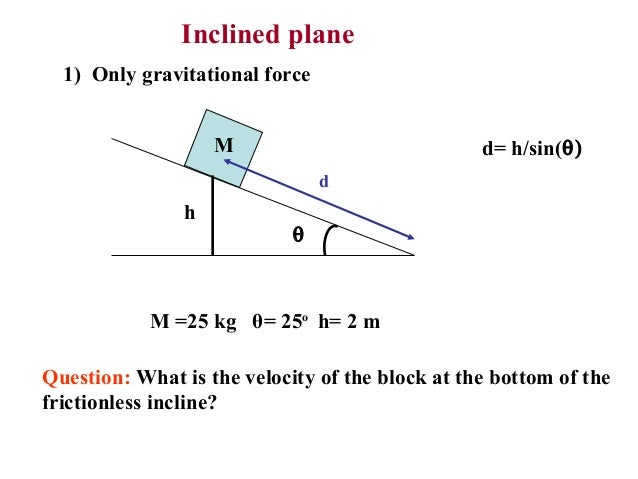
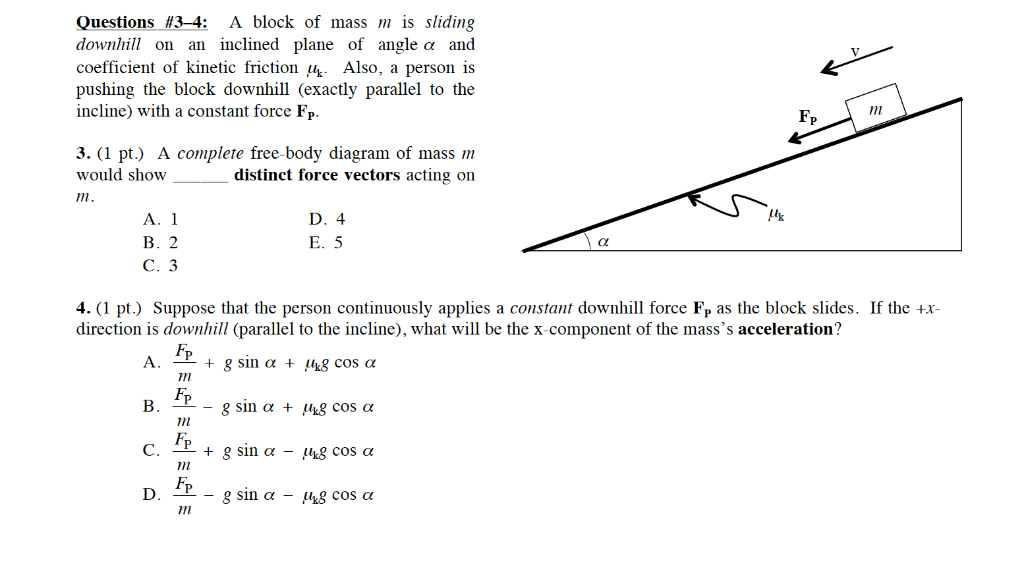









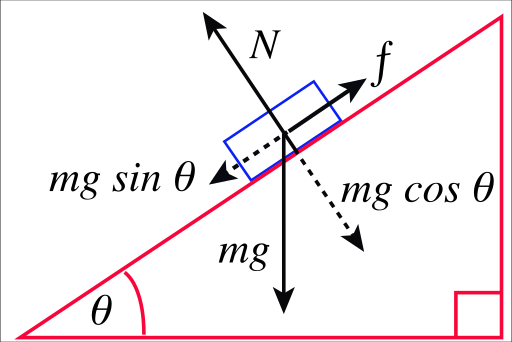






0 Response to "39 free body diagram on incline"
Post a Comment